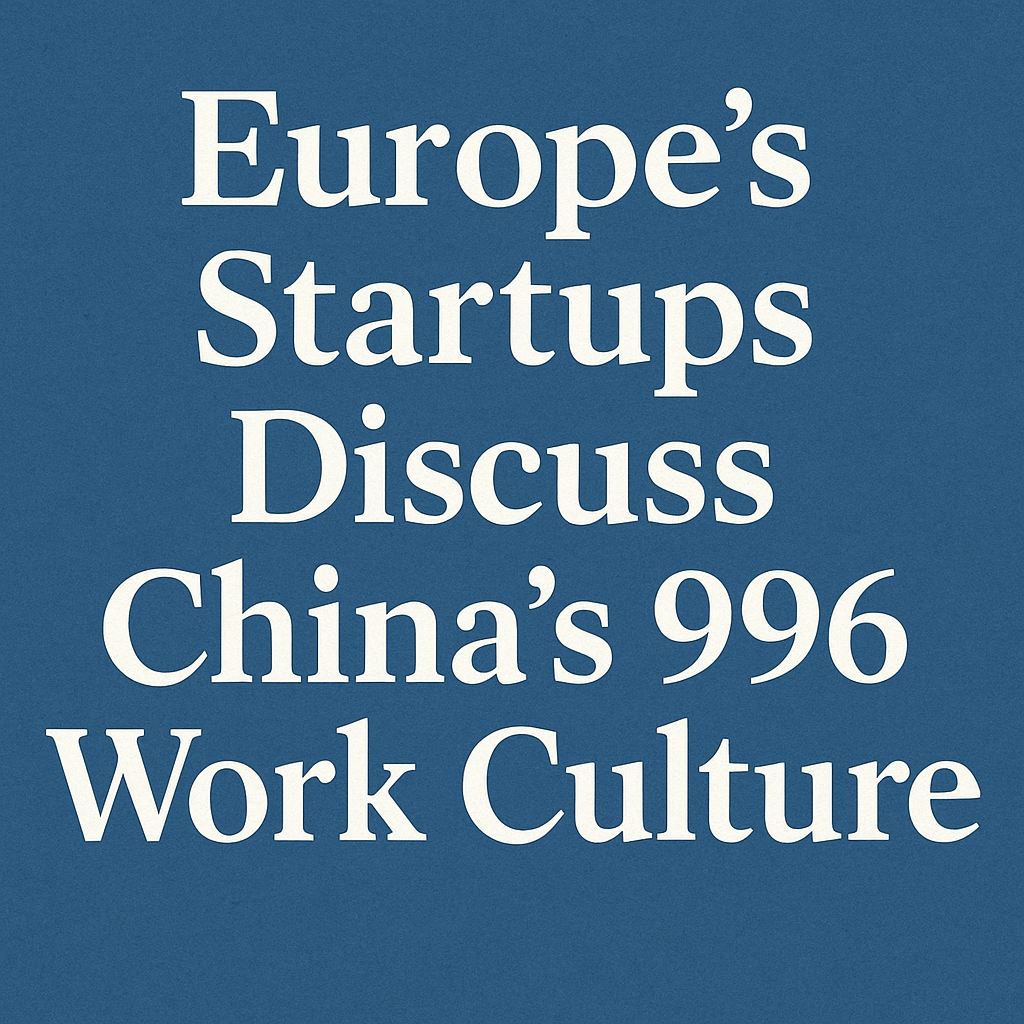Europe’s Startups Discuss China’s 996 Work Culture

A contentious debate is emerging within Europe’s startup ecosystem, centered around the controversial concept of 996. This term, derived from the Chinese work culture, signifies a grueling schedule of working from nine in the morning until nine at night, six days a week, amounting to a staggering 72-hour work week. This model has raised significant concerns about the implications for workers’ well-being and productivity across the tech sector.
The Catalyst of the Debate
European venture capitalists, driven by an ongoing narrative about enhancing the region’s competitive edge against the likes of U.S. and Chinese tech giants, have entered the fray. Harry Stebbings, founder of the venture capital firm 20VC, triggered the latest wave of discourse when he remarked on LinkedIn that the competitive atmosphere in Silicon Valley has intensified, urging European founders to adopt a more aggressive operational pace.
According to Stebbings, “7 days a week is the required velocity to win right now. There is no room for slip up,” effectively suggesting that the current global tech landscape demands an unwavering commitment from founders in order to keep pace with the best in the world.
Supporting Voices and Counterarguments
Following Stebbings’ comments, Martin Mignot, a partner at Index Ventures, echoed the sentiment, advocating for an increased workload amid the rapid advancements in artificial intelligence (AI) and intensifying global competition. Mignot referred to a 2018 editorial by Michael Moritz, the chairperson of Sequoia Capital, who had previously introduced the 996 work ethic as a model for Western entrepreneurs.
“Tech startups need to work long, intense hours more than ever,” Mignot asserted, indicating that the urgency stemming from the fast-evolving tech landscape mandates a maximization of productivity. In Europe, the average workweek hovers around 36-40 hours, making the 996 model strikingly different.
Criticism from Industry Peers
The reactions to this call for a 996 culture have not gone unnoticed. Key figures within the startup community have expressed their concerns over the potential ramifications of such a work ethos. Amelia Miller, co-founder of the wellness-focused venture Ivee, pointedly noted that burnout ranks as one of the top three reasons early-stage ventures fail. “It is literally a bad reason to invest,” she stated, highlighting the structural flaws that could be exacerbated by a culture of extreme work.
Similarly, Suranga Chandratillake, a general partner at Balderton Capital, challenged the calls to adopt a 996 mentality. “All the versions of this post I’ve read are from VCs who’ve never built a technology company themselves,” he remarked, emphasizing that external pressures from financiers don’t account for the on-the-ground challenges faced by startup founders striving to build sustainable companies.
The Dangers of the ‘Always On’ Culture
Chandratillake’s critical perspective highlights a significant concern about the “always on” mentality that often leads to burnout among founders and their teams. “You get addicted to this thing of, ‘I’m just gonna make these incremental improvements in my company,’” he lamented. This mindset can distract leaders from recognizing and adapting to larger strategic shifts occurring in their industries, potentially leading to failure.
Work Culture in Europe: A Historical Context
The dialogue around working hours and productivity is not new. The debate often surfaces in discussions about the disparity between European and American work ethics. Critics argue that the relatively low number of European firms in the Fortune 500 underscores a lack of competitiveness. Indeed, last year, Nicolai Tangen, CEO of Norway’s $1.8 trillion wealth fund Norges Bank Investment Management, asserted that Americans generally possess a higher level of ambition.
Conversely, some European entrepreneurs advocate for a less frenetic approach. Tom Blomfield, co-founder of Monzo, has emphasized that the pursuit of extreme work schedules may not resonate with British culture, where a more balanced work-life equation could yield better long-term results.
Assessment of Future Work Trends
Looking ahead, Chandratillake and others in the industry recognize that, while Europe might appear to lag in terms of sheer number of tech powerhouses, the potential for groundbreaking companies like Spotify, ASML, and Arm to reach trillion-dollar valuations remains intact. This vision implies a paradigm shift in how success can be achieved without resorting to exhaustive work schedules.
Despite the ongoing speculation regarding a potential shift toward a four-day work week, Chandratillake remains skeptical. “Every 100 years or so, it seems like someone suggests that we’re going to all work less, and unfortunately, they turn out to be wrong,” he remarked, concluding that while work methods may evolve, the underlying dynamics of labor are unlikely to change drastically in the near future.
Conclusion: A Balanced Approach to Success
The emerging discourse around the adoption of China’s 996 work culture in Europe sheds light on a larger issue regarding the future of work in the tech sector. While the proposals made by influential VCs may resonate with some, the pushback from experienced founders underscores the importance of integrating wellness and sustainability into the entrepreneurial landscape. As the tech ecosystem continues to evolve, a balanced approach that fosters innovation without sacrificing the well-being of individuals will be crucial for long-term success.
Source: fortune